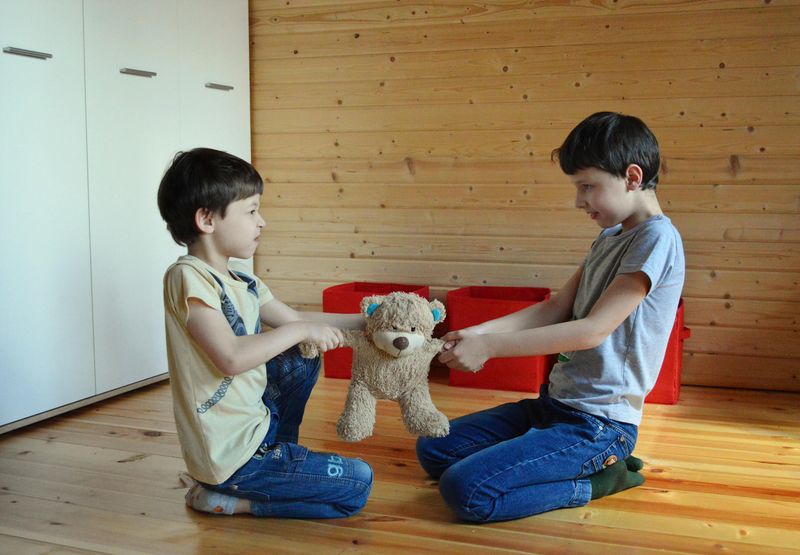11 Things People Who Grew Up With Siblings Understand Instantly

Growing up with siblings creates a unique bond filled with shared memories, rivalries, and unspoken rules. Whether you’re the oldest, youngest, or somewhere in between, certain experiences are universal in households with multiple children. These sibling moments shape us in ways only fellow brothers and sisters truly understand. If you grew up sharing your home with siblings, these situations will feel instantly familiar.
1. The Unwritten Law of Shotgun

Calling “shotgun” wasn’t just about getting the front seat—it was serious business with strict protocols. You had to be outside, within sight of the car, and the first to yell it. Any premature calls were immediately invalidated.
Siblings developed elaborate systems to ensure fairness, like rotating schedules or special occasion priorities. The front seat meant control of the radio and air conditioning, making it the most coveted position in family travel.
Violating shotgun rules could trigger arguments lasting the entire car ride, with parents eventually threatening to “turn this car around” if the bickering didn’t stop.
2. Food Theft Is A Capital Offense

Nothing sparked sibling warfare faster than discovering someone ate the leftovers you’d been thinking about all day. That slice of pizza or last cookie you mentally claimed? When it vanished, you launched a full CSI-style investigation to identify the culprit.
Smart siblings developed stealth tactics: eating only partial amounts to avoid detection, hiding special treats in vegetable drawers, or leaving decoy foods. Some even resorted to labeling food with threats of bodily harm.
Even as adults, many siblings still eye each other suspiciously when favorite foods disappear from the refrigerator during holiday gatherings.
3. Bathroom Hogging Tactics

Morning routines became strategic operations when sharing a bathroom with siblings. The early bird got the hot water, while latecomers endured icy showers and frantic rushes to avoid tardiness.
Knocking protocols evolved naturally—one knock for “hurry up,” multiple rapid knocks for emergencies, and the dreaded doorknob jiggle signaling parental intervention was imminent. Veterans mastered the art of brushing teeth while someone else showered.
Most maddening was the sibling who took 45-minute showers while claiming they’d “be out in a minute” to each increasingly desperate plea from the hallway.
4. The Invisible Boundary Line

Shared bedrooms created invisible territory borders that everyone understood but nobody discussed. Cross that line with so much as a pinky toe, and you’d trigger an immediate “MOM! He’s on my side!” diplomatic incident.
These boundaries extended to the backseat of cars, where the middle armrest or a strategically placed jacket marked the demilitarized zone. Veterans recall the horror of long road trips where a sibling slowly expanded their territory inch by inch.
Even imaginary boundaries had real consequences—the silent treatment, retaliatory mess-making, or the nuclear option: touching your sibling’s prized possessions without permission.
5. Remote Control Warfare

The family TV remote wasn’t just a device—it was a symbol of power. Possessing it meant controlling the evening’s entertainment, leading to elaborate schemes to maintain or seize control.
Experienced siblings perfected sneaky moves like sitting on the remote or developing lightning-fast reflexes to grab it during commercial breaks. The phrase “I was watching that!” echoed through households nationwide when channels changed without democratic process.
Parents eventually instituted turn-taking rules that nobody followed, resulting in classic standoffs where siblings watched shows nobody actually wanted just to spite each other.
6. The Secret Language

Siblings develop their own dialect—inside jokes, made-up words, and references to incidents from years ago that make no sense to outsiders. A single raised eyebrow across a dinner table can communicate entire conversations while parents remain clueless.
This secret language proves particularly useful during family gatherings when you need to mock a weird relative or signal it’s time to leave. One cryptic phrase can trigger uncontrollable laughter while everyone else wonders what’s so funny.
Even as adults, siblings can reduce each other to tears of laughter with references to childhood incidents that sound completely mundane when explained to confused spouses.
7. The Blame Game Olympics

When something broke, siblings developed Olympic-level skills in deflection and blame assignment. The classic “not me” defense emerged before parents even finished asking who was responsible.
Advanced practitioners mastered the art of plausible deniability, creating elaborate alibis or strategically disappearing when accusations flew. The youngest often wielded their “baby of the family” status as immunity, while oldest siblings complained about always being blamed by default.
Many siblings still remember the rare occasions when everyone maintained solidarity through a unified denial, creating an impenetrable wall of “I don’t know what happened” that frustrated parents but strengthened sibling bonds.
8. Hand-Me-Down Fashion Statements

Younger siblings know the unique experience of receiving clothes with someone else’s memories already embedded in them. That cool jacket finally passed down after years of coveting it—only to discover it’s now hopelessly out of style.
Each garment carried a history: “Don’t stretch my sweater!” or “That was my favorite shirt!” Creating your own identity meant finding ways to customize these pre-loved items or saving for that one special piece that was yours alone.
The ultimate hand-me-down betrayal? When parents gave away something you were saving for a younger sibling without consulting you first.
9. The Silent Treatment Supreme Court

Siblings invented the silent treatment long before relationship experts identified it as problematic. What began as a simple refusal to speak could evolve into elaborate pantomimes where the offending party became completely invisible.
Parents served as reluctant judges, forced to mediate with “Tell your brother dinner’s ready” relayed messages. The standoff typically ended when one sibling cracked at the opportunity for alliance against another sibling or when something too funny happened not to share.
The true masters could maintain silence for days while still communicating everything through exaggerated sighs, eye rolls, and strategic door slams.
10. The Snitch Protocol

Every sibling understands the complicated ethics of tattling. Minor infractions stayed between siblings, but major rule-breaking activated the nuclear option: telling parents. The phrase “I’m telling!” struck fear into young hearts everywhere.
Savvy siblings learned to negotiate immunity deals—”If you don’t tell about the window, I won’t mention the cookies”—creating mutually assured destruction pacts. The worst betrayal came from the sibling who maintained a perfect angel façade with parents while collecting blackmail material.
Many adult siblings still honor these childhood codes, protecting each other’s secrets decades after the statute of limitations on parental punishment has expired.
11. The Shared Defense Pact

Despite endless bickering at home, siblings instantly united against outside threats. The unspoken rule was clear: only we get to torment each other—outsiders who tried faced the combined fury of the entire sibling alliance.
This protective instinct activated automatically when a sibling faced trouble with neighborhood kids, school bullies, or critical relatives. The same brother who put gum in your hair that morning would fearlessly defend your honor by afternoon.
Many adults report this reflex remains active decades later—criticism of a sibling from a friend or in-law still triggers an immediate defensive response, regardless of any ongoing family squabbles.

Comments
Loading…